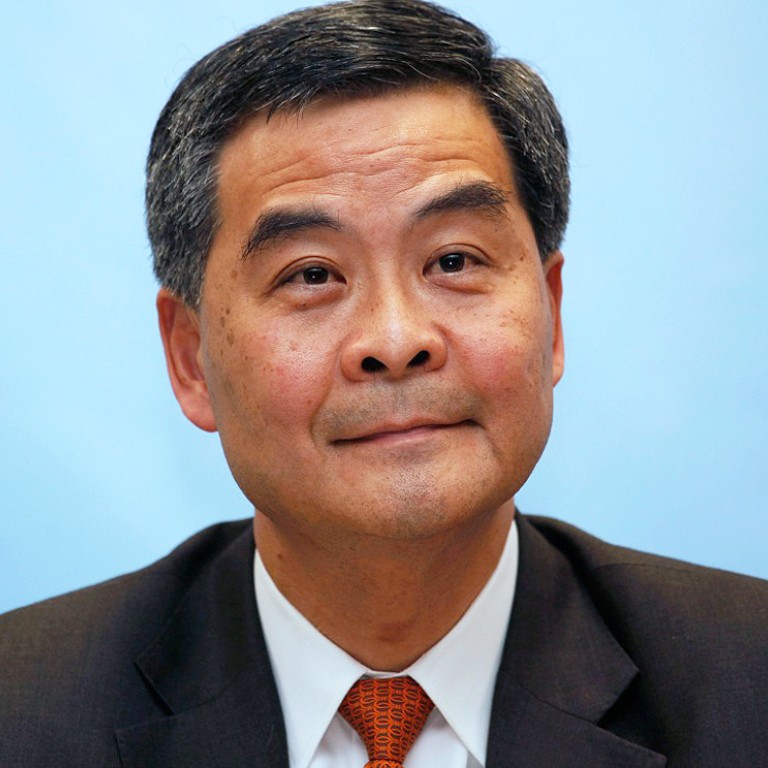
CY Leung faces more questions about secret HK$50m deal after rival bid is revealed
On the same day that the chief executive signed a lucrative deal as part of his former company’s sale to Australian firm UGL, a second offer arrived that exceeded UGL’s bid - raising questions about Leung's conduct.
On the same day that Hong Kong chief executive Leung Chun-ying signed an undisclosed agreement worth £4 million (HK$50 million) as part of his former company’s sale to listed Australian engineering firm UGL, a second offer arrived to buy the company that exceeded UGL’s bid by £90 million.
The existence of the second bid is likely to raise further questions about Leung’s conduct in 2011 during his final days as a DTZ board member, and in particular, whether he was able to provide impartial advice on the merits of the second offer given that he stood to gain HK$50 million if the sale to UGL went through.
UGL eventually bought London-listed DTZ for £77.5 million in a deal that wiped out both shareholders and unsecured creditors, and required British-taxpayer-backed bank RBS to take a 30 per cent loss on a £110 million loan to the troubled real estate consultancy.
Leung has faced fresh calls to resign since Fairfax Media revealed the secret HK$50 million non-compete deal last week, which included an agreement to be an adviser to UGL “from time to time”.
Hong Kong’s anti-corruption agency, the Independent Commission Against Corruption, has opened a file on the matter after a complaint was lodged by members of an opposition political party.
Lawmakers also want to use parliamentary powers to investigate if Leung breached Hong Kong’s anti-bribery laws. The chief executive faces investigation in Australia too, after a senator there asked federal police to examine whether the deal broke the country’s foreign bribery laws.
Those laws make it illegal to provide a benefit to a foreign public official in order to obtain a business advantage.
Accountants also say Leung should have paid profits tax for the HK$50 million he received even if, as Leung says, he ultimately did not provide any service to UGL after signing the deal.
According to a report by DTZ administrators Ernst & Young, now filed at Companies House in London, on December 2 a “confidential bidder” offered to inject £48.8 million in new equity into DTZ, and to refinance existing loans in exchange for a 50.1 per cent stake in the firm. The deal was valued at 18 pence a share.
Leung held 8.6 million shares in April 2011, according to DTZ’s annual report, valuing his stake at £1.54 million if the second offer was successful.
Leung would not say whether or not he welcomed the new suitor. In an email response to the Post, Leung’s spokesman Michael Yu wrote, “the decision to sell DTZ was a decision made by DTZ board of directors.”
In its report, Ernst and Young said the new offer would have taken eight weeks to complete and it was decided there was “insufficient time” given DTZ’s “cash flow position” and “lack of further funding” from RBS.
The bidder was later reported in the Chinese press to be Tianjin Innovation Financial Investment Company, though the Post has been unable to reach the company for confirmation. It is not yet known whether Leung – in his role as a board member and chairman of DTZ’s lucrative Asia-Pacific operations – was asked for his opinion on Tianjin Financial.
Leung announced his resignation from DTZ’s board on November 24, which took affect December 4, in order to stand as a candidate in Hong Kong’s chief executive election. His resignation as Asia-Pacific chairman was effective January 2012.
On December 2, Leung signed an agreement with UGL that stipulated that he would receive £4 million in two instalments in 2012 and last year should the UGL bid prove successful. UGL and Leung said the money was to prevent him from forming or joining a rival firm within two years.
In an “additional commitment” clause, Leung agreed to “[act] as a referee and adviser from time to time” if UGL asked, raising questions about whether it was securing Leung’s future services. As chief executive he could not take up a paid advisory job for a commercial entity.
The payments are not mentioned in Leung’s annual disclosure filings.
Leung inserted a handwritten clause into the contract saying he would perform the required duty “provided that it does not create any conflict of interest”.
UGL said that the vendor in the deal, RBS, and their advisers were fully aware of UGL’s intention to enter into an arrangement with Leung.
However, both the former chairman of DTZ, Tim Melville-Ross, and Ernst and Young said they were not aware of Leung’s arrangement with UGL.
Hong Kong lawmaker Kenneth Leung Kai-cheong has filed a complaint with Britain’s Listing Authority asking it to check if DTZ and Leung Chun-ying had complied with listing rules and the Companies Act, and whether Leung, as a director, had fulfilled his duty to look after the firm’s interests – considering the payments had led to a reduced purchase price.
Kenneth Leung said it “went against common sense” that DTZ would pass up the rival bid, which offered more money and a "better future" for its employees. "Has [Leung Chun-ying] made a decision in DTZ shareholders’ best interest?” the lawmaker asked. “Or has he rushed to a decision that might harm the shareholders’ and creditor’s interests? The business trade itself has a very big problem no matter if he is chief executive or not.”
UGL has a multimillion-dollar contract with MTR Corporation, the company that runs Hong Kong’s rail network, to maintain 120 trains. MTR is majority-owned by the government.
Raymond Chien Kuo-fung, the chairman of MTR, has been an independent director at UGL since September 2012. In October 2012, Leung Chun-ying’s government reappointed Chien as MTR chairman for a fourth three-year term.

